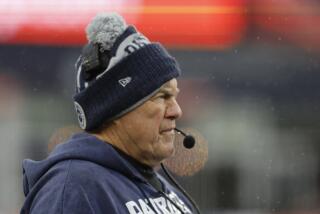COCAINE AND A SUPER BOWL TEAM: THE LAST STRAW : Globe Says It Delayed the Story Not to Help Patriots but to Confirm Facts
- Share via
Coach Raymond Berry of the New England Patriots said Monday that a Boston Globe sportswriter had learned of the Patriots’ drug problems last month but had withheld publication of the information until after the Patriots’ season was over.
“He came to me and helped me by keeping it out of the paper,” Berry said.
So why, in the mountain of stories from New Orleans during Super Bowl hype week, was there not a story about the Patriots’ drug problem?
A lot of newspaper people were wondering that Tuesday, after the Globe had published its story on the Patriots’ drug problems two days after New England’s thrashing by the Chicago Bears in the Super Bowl, 46-10.
In other words: What did the Globe know, and when did it know it?
“We simply didn’t have a story (earlier),” Vince Doria, the paper’s sports editor, said by telephone Tuesday.
“The evolution of the story is this: There were rumors about drug usage (by Patriot players) as early as December, and our beat reporter, Ron Borges, was working on the story. But he could come up with no details, no names and no facts.
“Just before the Miami playoff game (Jan. 12), the rumors grew stronger. Borges went to Berry and asked about it. Berry, after being evasive at first, agreed to give Borges some background information on the condition that the story not be used until after the season.
“Borges agreed, he was backgrounded by Berry, and I agreed with the conditions, when Borges reported back to me.
“At that time, only Berry, Patrick Sullivan (New England’s general manager) and Borges knew of the problem.
“Meanwhile, we continued to try to develop the story. We felt bound to our commitment with Berry, but also (felt free) to try to develop the story on our own, by getting others to go on the record. We were unsuccessful. At that point, we had a story with no one on the record, no details, no specifics.
” . . . I decided if we waited, we’d have a much more thorough, more substantial story. We couldn’t have obtained the story any other way.”
Doria, 38, has been the Globe’s sports editor for the last eight years and assistant managing editor for sports the last two years. He said he has no regrets about how the story was handled.
“We handled it the only way we could have, given our options at the time,” he said. “We’d handle it the same way if we had to do it again tomorrow.”
Doria said he was disturbed by Berry’s comment that Borges had helped the Patriots by keeping the story out of the paper.
“That does bother me,” Doria said. “I don’t think Raymond Berry understands our function here. We’re not in business to help him. He’s simply not cognizant of the press’ function.”
Berry, finally talking on the record, admitted in Tuesday’s Globe story that at least five members of his team have serious drug problems.
“I would say we may be 28th in the league as far as this problem goes, but there are at least five players we know who have a serious problem, and five to seven more whom we suspect very strongly,” he said.
“We have a situation that exists here that we feel is intolerable. It has been going on for a year and I had to weigh the damages of doing something about it immediately by going public.”
Berry said he had waited until the season ended before he publicized the issue so as not to distract the players.
“I was aware that if this became public it would dominate all other issues, including our upcoming (playoff) games,” Berry told the Globe. “Because of that I did nothing until the season ended.”
The story did not identify which players are suspected of having drug problems.
“I don’t want to get into details,” Doria said. “It’s still a working story for us. We found out some new things today.”
More to Read
Go beyond the scoreboard
Get the latest on L.A.'s teams in the daily Sports Report newsletter.
You may occasionally receive promotional content from the Los Angeles Times.










